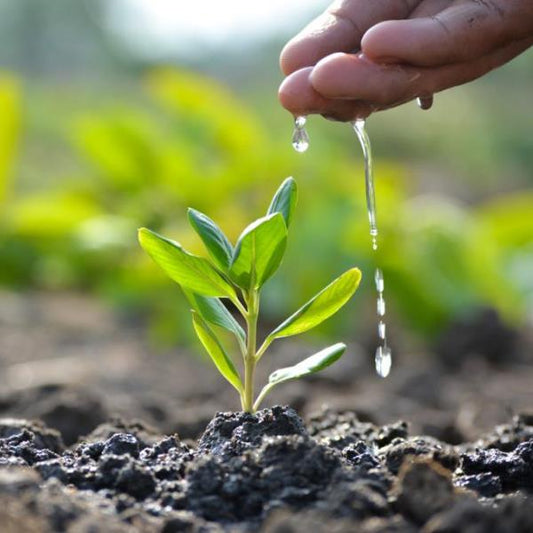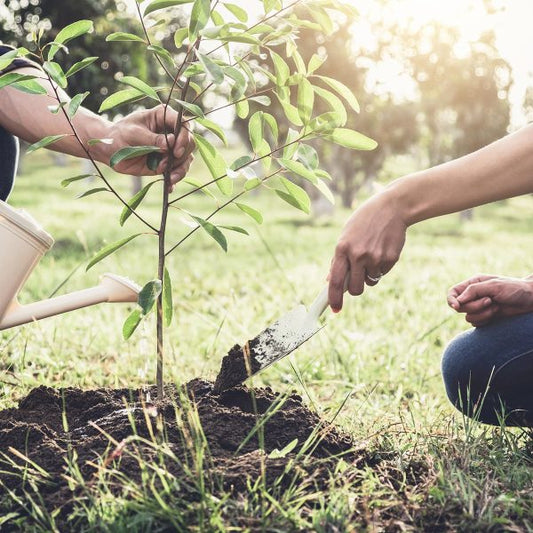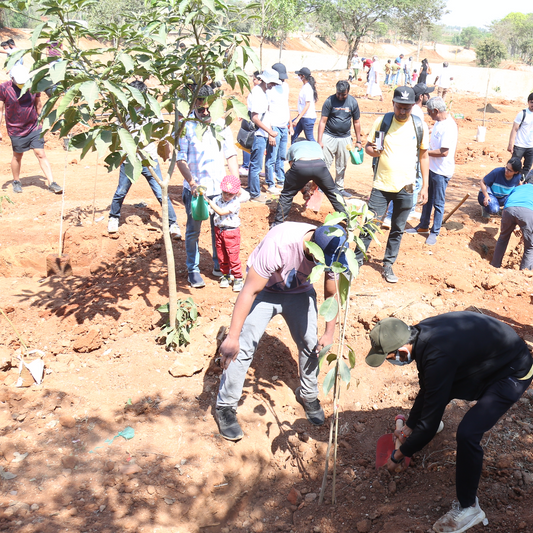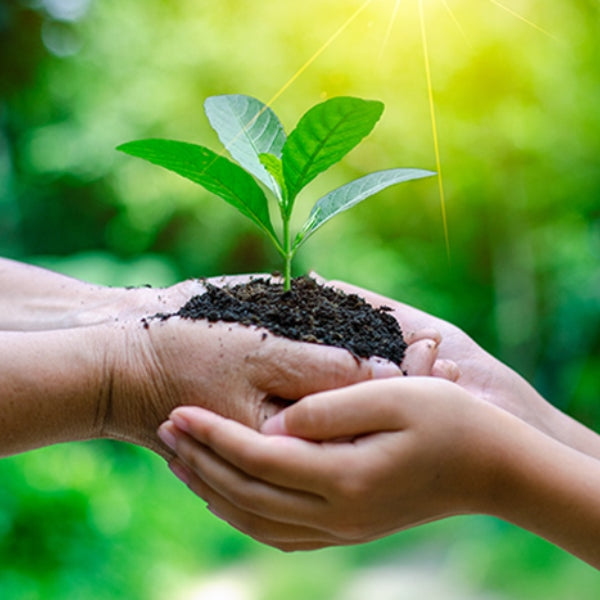V Group’s Green Legacy: Sustainable Tree Planting for CSR
V Group’s tree plantation initiative, under its Corporate Social Responsibility (CSR) program, focuses on promoting sustainable agroforestry practices Read more
V Group’s Green Legacy: Sustainable Tree Planting for CSR
Plantation Location
Rajpur, Barwani,Madhya Pradesh- 451447
Forest Type: Agroforest
V Group’s tree plantation initiative, as part of its CSR strategy, adopts an agroforestry concept to promote sustainable land management and community development. The initiative combines agricultural crops and tree planting to create symbiotic systems where both trees and crops benefit from shared resources. By incorporating various tree species that are compatible with local crops, the initiative enhances soil health, regulates water cycles, and creates a balanced ecosystem that supports biodiversity.
The agroforestry concept utilized by V Group includes practices such as intercropping, where trees are integrated with row crops to maximize land productivity, and boundary planting, where trees are strategically planted along the perimeters of farmlands to serve as windbreaks, erosion barriers, and habitat corridors. These practices result in improved soil fertility, reduced carbon emissions, and increased resilience of farmlands against climate variability.
This approach not only restores degraded landscapes but also empowers farmers with diversified income streams, fostering sustainable livelihoods.
Through its commitment to agroforestry, V Group aims to create a model that integrates environmental conservation with social and economic growth, ensuring a lasting impact on communities and ecosystems.
Advantages Of Agroforestry
Enhanced Biodiversity and Ecosystem Services
Agroforestry promotes biodiversity by creating diverse habitats for wildlife and enhancing the presence of beneficial flora and fauna. This results in healthier ecosystems that support pollinators, reduce pest populations naturally, and contribute to overall ecological balance.
Improved Soil Health and Fertility
The integration of trees with crops enhances soil structure and fertility. Trees increase organic matter, improve nutrient cycling, and reduce soil erosion, resulting in more fertile and resilient soils that support sustainable agricultural productivity over time.
Increased Water Retention and Reduced Erosion
Tree roots help bind the soil and reduce surface runoff, enhancing water retention and preventing erosion. This is particularly beneficial in areas prone to land degradation, ensuring better water availability for crops and contributing to groundwater recharge.
Carbon Sequestration and Climate Mitigation
Trees in agroforestry systems act as carbon sinks, absorbing carbon dioxide and mitigating the effects of climate change. By sequestering carbon both above and below ground, the initiative helps reduce greenhouse gas emissions and enhance environmental sustainability.
Diversified Income Sources
Agroforestry systems enable farmers to cultivate multiple products within the same land area, such as fruits, timber, medicinal plants, and crops. This diversification provides additional income streams, reduces economic risks, and enhances food security for local communities.
Improved Microclimate
The presence of trees in agroforestry systems modifies the microclimate by providing shade, reducing wind speeds, and maintaining cooler temperatures. This creates a more favorable environment for crops and livestock, reducing stress and increasing productivity.
Empowerment and Capacity Building
Through training and resource support, V Group’s initiative equips farmers with knowledge and skills in sustainable land management. This empowers them to maintain agroforestry systems effectively, fostering long-term self-reliance and community development.
Long-term Sustainability
Agroforestry is a sustainable land-use system that improves ecological and economic resilience. It ensures the long-term sustainability of agricultural landscapes by balancing short-term agricultural outputs with long-term environmental benefits.
By leveraging these advantages, V Group’s agroforestry-based tree plantation initiative not only enhances environmental health but also contributes to the socio-economic well-being of local communities, creating a model for sustainable development.
Activities During Tree Plantation
Tree Plantation Purpose
V Group’s tree plantation initiative, implemented under its CSR program with an agroforestry concept, contributes significantly to several United Nations Sustainable Development Goals (SDGs) and addresses key Environmental, Social, and Governance (ESG) principles, showcasing its commitment to sustainable development and community well-being.SDG's Achieved Through Tree Plantation
1. SDG 1: No Poverty
2. SDG 2: Zero Hunger
3. SDG 6: Clean Water and Sanitation
4. SDG 8: Decent Work and Economic Growth
5. SDG 12: Responsible Consumption and Production
6. SDG 13: Climate Action
7. SDG 15: Life on Land
8. SDG 17: Partnerships for the Goals
V Group collaborates with local communities, NGOs, agricultural experts, and government agencies to implement its agroforestry initiative effectively. These partnerships enable knowledge sharing, resource mobilization, and collective efforts toward achieving broader sustainability goals.By aligning its tree plantation initiative with these SDGs, V Group is fostering a sustainable development model that integrates environmental conservation, social responsibility, and economic growth, making a lasting positive impact on both people and the planet.
ESG's Achieved Through Tree Plantation
Environmental Goals(E)
The initiative enhances carbon sequestration, supports biodiversity, and improves soil and water management by integrating diverse tree species with agricultural crops, creating healthier ecosystems and building resilience against climate change.
Social Goal(S)
It empowers local communities through training and capacity building, while providing additional income sources from agroforestry products like fruits, timber, and medicinal plants. This not only supports livelihoods but also improves food security and overall community health.
Governance and Ethical Goals(G)
V Group ensures transparency, accountability, and ethical collaboration by partnering with local farmers, NGOs, and government bodies. Regular monitoring, compliance with sustainability standards, and active stakeholder engagement demonstrate the company’s adherence to strong governance practices.
Through this initiative, V Group exemplifies how businesses can contribute to environmental conservation, socio-economic development, and responsible governance, creating long-term value for society and the planet.
Commitment by Grow Billion Trees
Trending
Trees for Corporates
FAQ
What is V Group’s tree plantation initiative?
V Group’s tree plantation initiative is a part of our Corporate Social Responsibility (CSR) activities focused on sustainable development. Through this initiative, we adopt an agroforestry model that integrates trees and crops, benefiting both the environment and local communities. We aim to restore ecosystems, improve biodiversity, and provide additional income opportunities to farmers. The initiative involves planting native and climate-resilient species that contribute to carbon sequestration and soil enrichment while ensuring the long-term sustainability of the land.
What are the benefits of tree plantation in agroforestry?
Tree plantation in agroforestry offers multiple benefits, such as enhancing soil fertility, improving water retention, and providing habitats for wildlife. By integrating trees with agricultural crops, agroforestry systems also help sequester carbon, reduce greenhouse gas emissions, and protect against soil erosion. Additionally, agroforestry contributes to food security and provides diversified income sources for local communities through the production of fruits, timber, and other non-timber forest products.
How does V Group support farmers through agroforestry?
V Group supports farmers through agroforestry by providing training, resources, and ongoing technical support. We work closely with local communities to select the right tree species and implement sustainable land management practices. Our goal is to empower farmers with the knowledge and skills to maintain agroforestry systems, which not only improve agricultural productivity but also offer long-term economic benefits. The initiative helps farmers build climate-resilient landscapes and generate additional revenue through agroforestry products.
Why is agroforestry important for sustainable development?
Agroforestry is crucial for sustainable development as it combines agriculture and forestry practices to create a balanced ecosystem. It supports environmental sustainability by enhancing biodiversity, improving soil health, and sequestering carbon. Agroforestry also promotes social and economic development by providing additional income streams, reducing poverty, and ensuring food security. As a comprehensive approach, it addresses various aspects of sustainability, making it a key contributor to achieving the United Nations’ Sustainable Development Goals (SDGs).
How does V Group ensure the success of its agroforestry projects?
V Group ensures the success of its agroforestry projects through careful planning, collaboration with local communities, and continuous monitoring. We conduct site assessments, select appropriate tree species, and implement best practices for planting and maintenance. Regular training sessions for farmers and community members help build capacity, while impact assessments ensure that the project is meeting its environmental and social goals. Our approach is adaptive, allowing us to address challenges and optimize outcomes for all stakeholders.
What are the environmental benefits of V Group’s tree plantation initiative?
V Group’s tree plantation initiative offers numerous environmental benefits, including enhanced carbon sequestration, improved air quality, and restored biodiversity. By planting native species and integrating them with agricultural crops, we promote healthier ecosystems, reduce soil erosion, and conserve water. Our initiative also helps mitigate the effects of climate change by absorbing carbon dioxide and providing habitats for various plant and animal species, contributing to overall ecosystem stability.
How does V Group contribute to community development through tree plantation?
V Group’s tree plantation initiative contributes to community development by creating employment opportunities, providing training, and supporting sustainable livelihoods. We engage local communities in the entire process—from planning to implementation—ensuring their active participation and ownership. The initiative generates additional income for farmers through the sale of agroforestry products and enhances food security. By improving the local environment and providing economic benefits, our initiative fosters social and economic growth for communities.
What tree species are used in V Group’s agroforestry initiative?
In our agroforestry initiative, V Group selects native and climate-resilient tree species that complement agricultural crops and support local biodiversity. Commonly used species include fruit-bearing trees like mango and jackfruit, along with timber trees such as teak and neem. These species are chosen based on their ability to improve soil health, provide economic value, and adapt to local climatic conditions. By integrating diverse tree species, we ensure the sustainability and productivity of agroforestry systems.
How does agroforestry help in climate change mitigation?
Agroforestry helps in climate change mitigation by capturing and storing carbon dioxide in both trees and soil. The diverse vegetation in agroforestry systems acts as a carbon sink, reducing greenhouse gas emissions and helping to regulate local microclimates. Additionally, trees protect against soil erosion and water loss, making landscapes more resilient to extreme weather events. As a result, agroforestry not only reduces carbon emissions but also contributes to climate adaptation and disaster risk reduction.
How is V Group’s agroforestry initiative aligned with the UN’s SDGs?
V Group’s agroforestry initiative aligns with several United Nations Sustainable Development Goals (SDGs), including SDG 1 (No Poverty), SDG 2 (Zero Hunger), SDG 13 (Climate Action), and SDG 15 (Life on Land). The initiative promotes sustainable agriculture, enhances food security, and improves community livelihoods. It also contributes to climate change mitigation by sequestering carbon and restoring ecosystems. By integrating economic, environmental, and social benefits, our initiative addresses multiple SDGs, supporting global sustainable development.
Population Plantation Drives
Corporate Planting Drive
Connect with us
-
👥 Corporates
If you are looking for:
- 🌲 Tree Plantation Events
- 📊 CSR Projects
📧 corporate@growbilliontrees.com
📞 +91 9699723523
💬 WhatsApp (Only): +91 9370599291
🕒 Mon - Sat | 10am - 7pm IST
-
🧩 Tree Plantation NGOs
If you are looking for:
- 💰 Financial Assistance
- 🤝 Operational Support
📧 support@growbilliontrees.com
📞 +91 9699723523
💬 WhatsApp (Only): +91 9370599291
🕒 Mon - Sat | 10am - 7pm IST
-
🌼 Individuals
If you are looking for:
- 👥 Group Tree Plantation Drive
- 🌳 Bulk Tree Plantation
📞 +91 9699723523
💬 WhatsApp (Only): +91 9370599291
🕒 Mon - Sat | 10am - 7pm IST






















